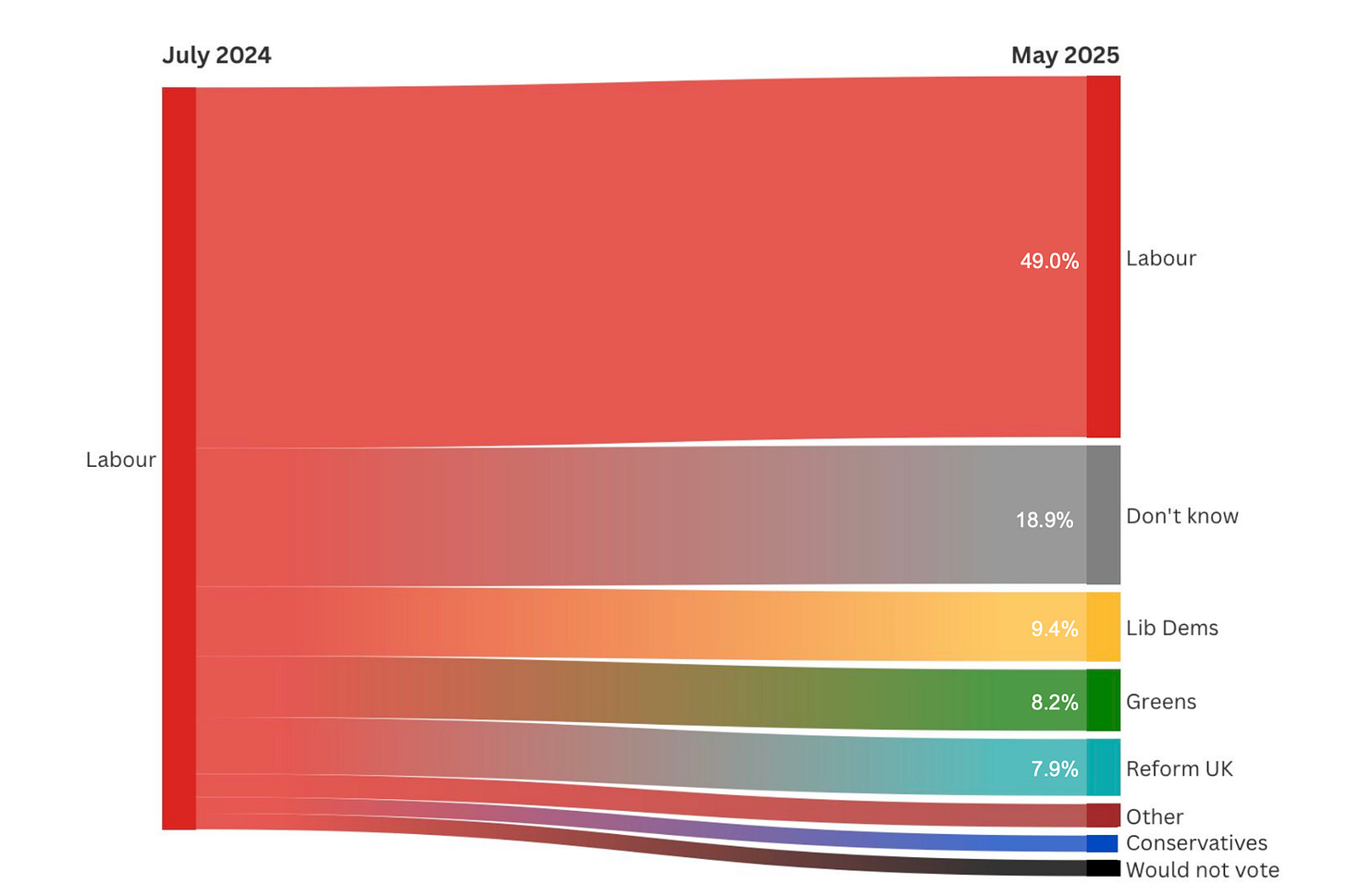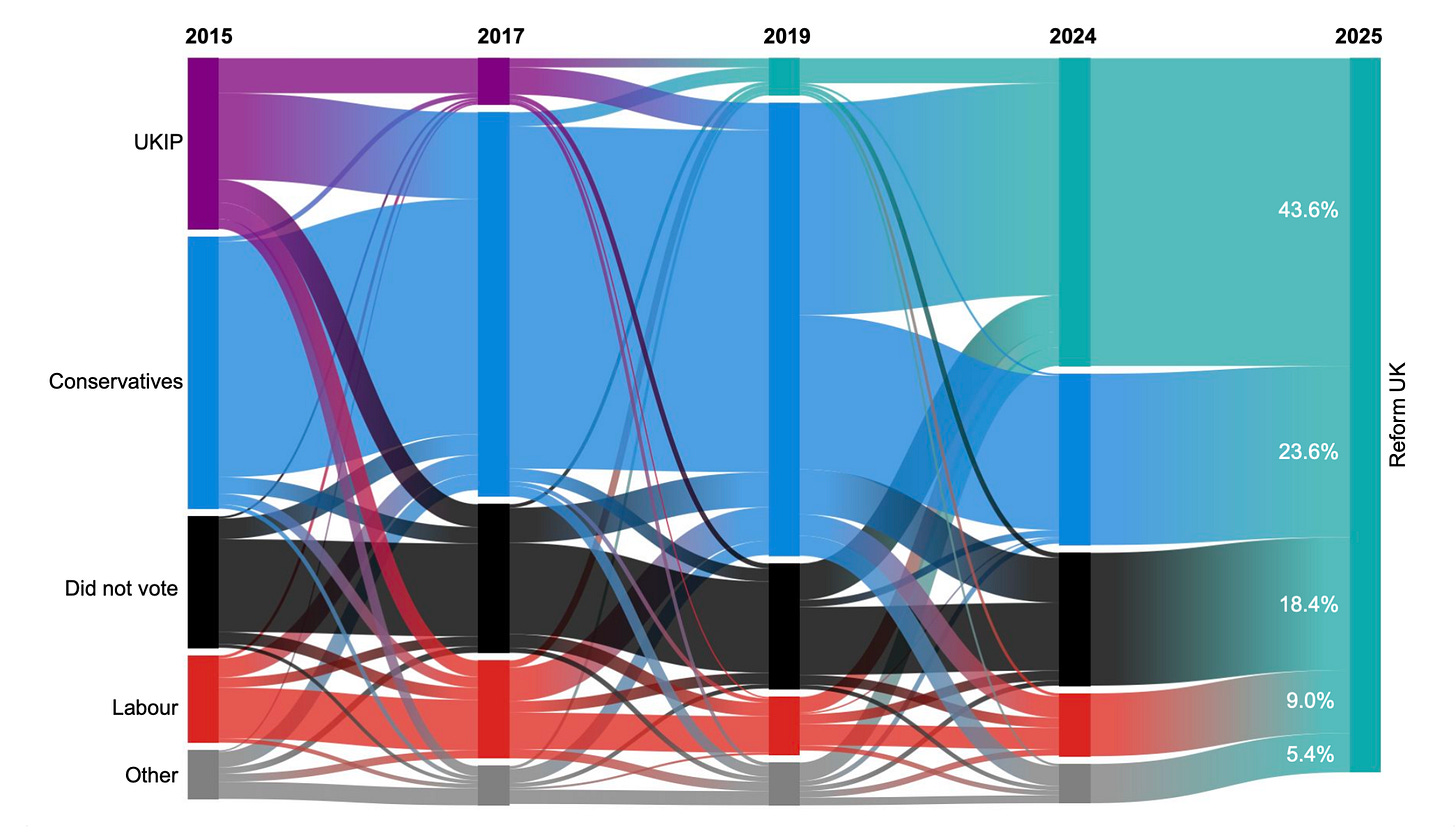The median voter isn’t a Labour–Reform switcher
Farage isn’t Starmer's biggest threat — appearing toxic to liberal voters is
The 2010s were not an auspicious decade for Blairites. First came Ed Miliband who, having narrowly defeated his brother David for the leadership, swiftly set about repudiating much of the New Labour project. Following a comprehensive defeat at the next general election, party members turned to the warm embrace of Jeremy Corbyn. The Blairite candidate, Liz Kendall, secured a pitiful 4.5% of the vote.
Around this time, John Rentoul, The Independent’s chief political commentator (as well as chief defender of Tony Blair) and Philip Collins, a journalist and former speechwriter to Blair, got into an online disagreement. It may have been about inheritance tax, but I haven’t tracked down the precise post and I’m not prepared to dive into X’s archives to locate it. Anyway, by the end of it, one of them quipped:
“We’re the only two Blairites left and we’re hopelessly split!”
How times have changed.
Blair’s Grandbabes
Fast forward to 2025, and supporters of Labour’s most successful leader are everywhere. Sat around the cabinet table are the likes of Pat McFadden, as well as (not technically Blairites in the sense that they don’t owe their political careers to him but for the sake of shorthand) Wes Streeting, Peter Kyle and Kendall herself. In fact, there might be more Blairites in this government than in the first Blair ministry.
Behind the scenes, their presence is even more apparent. Tim Allan, Blair’s one-time deputy director of communications and founder of the Portland communications agency, has been called in to — for want of a better word — modernise Labour’s media operation. Jonathan Powell, the former prime minister’s chief of staff, is in situ as Keir Starmer’s national security advisor, with vast influence over foreign policy. While Liz Lloyd, director of policy delivery in Downing Street, performed a similar role for Blair.
All this before we come to former members of staff (Starmer has a lot of former members of staff) such as Matthew Doyle, Peter Hyman and a certain Peter Mandelson. Of course, Blair himself is said to be in regular contact with Starmer, while reports from the Tony Blair Institute, a consulting group cum think tank, pack a punch. For goodness’ sake, even digital ID cards — the ultimate Blairite shibboleth — are back on the agenda.
Downs with the median voter theory
Blairism. The Third Way. Neoliberal hackery. Call it what you want — but in the crudest terms, they say that Labour wins elections by planting its flag on the centre ground, appealing to the median voter with reassuring glances and sidestepping all talk of tax rises. Anthony Downs wrote an entire treatise1 on this back in the 1950s and I’m sad enough to have done my university dissertation on it2.
Clearly, this was a highly successful strategy in the 1990s and early 2000s. Blair revelled in assuaging the fears of Middle England, painstakingly convincing millions of Conservatives to vote Labour, Liberal Democrat or simply stay at home on election day. In doing so, he helped lock the Tories out of power for a generation.
The question today isn’t whether political moderation and economic competence are no longer prerequisites for electing a Labour government — or even whether the median voter still exists. Rather, it is whether that median voter is a Labour/Reform switcher. And the evidence appears to be heading in one direction.
A recent report by Professor Jane Green and Marta Miori for Nuffield College finds that, despite its consistent polling lead and Nigel Farage’s confident claims, Reform UK is “unlikely to pose a significant electoral threat to Labour’s 2024 voters”. Using British Election Study data and following an analysis of Labour’s vote, the academics show that the “vast majority” of the votes the governing party has lost since the election are to other parties and to ‘undecided’, not to Reform. And this pattern holds up even in heavily ‘Leave’ voting areas of the country.
It’s understandable that Reform’s polling should rattle Labour strategists, but the data suggests the real risk lies elsewhere. Green and Miori highlight two key reasons. First, that post-2016, even in ‘Leave’ areas, Labour voters are as likely to be ‘Remainers’ as those in Remain-leaning constituencies. And second, few Reform supporters have even voted Labour at any point this century. Instead, they conclude: “Reform’s gains have long originated from the Conservative split on the right, and are continuing to do so today.”
Sure, Labour is losing some votes to Reform. It would be odd if they weren’t. But the party is losing many more to the Lib Dems, Greens and Don’t know. Looking ahead, Green and Miori project that the potential for Reform to further eat into Labour’s 2024 support is likely “extremely limited”. Another way of looking at this is by analysing where Reform’s support is coming from. As you can see from the below chart, that is largely from the Conservatives and hitherto ‘non-voters’.
It’s not all good news for Labour. The party benefited hugely from voter fragmentation at the last election, securing a 174-seat majority on just 33.7% of the vote. But if Reform hoovers up enough Conservatives, it won’t need many Labour converts to flip large numbers of seats. As the report notes, “Labour’s broad splintering of voters towards the left and to ‘undecided’ will further lower the share needed for Reform to overtake them in seats where they are in contention.”
All the more reason, then, for Labour strategists — nominally led by the prime minister — to do some hoovering up of their own.
Operation stop pissing people off
Over the past year, the government, spearheaded by long-time Starmer aide Morgan McSweeney, has relentlessly focused on issues such as immigration. This makes a certain kind of sense: opposition to Farage is likely to form the backbone of Labour’s ‘better the devil you know’ 2029 election strategy.
But if few voters are actually switching from Labour to Reform, and the party is leaking support to liberal and Left parties — or to voter apathy — then a strategic rethink becomes essential.
In Friday’s newsletter, following the Caerphilly by-election, I wrote that first-past-the-post can still prevent a Reform landslide, if the parties of the Left bloc work together rather than cannibalise their votes. Given the fact that Labour is the government, and holds a great many seats in parliament, that should benefit Starmer. Yet for tactical voting to be effective, voters must actually be prepared to vote Labour to prevent a Reform win.
That means, in the words of The Economist’s Duncan Robinson, the party must stop punching its own voters in the face. Those baby steps towards blaming Brexit for the UK’s economic malaise may be a sign of a change in strategy (or, alternatively, of yet more incoherence.)
None of this means that Rachel Reeves ought to junk her fiscal rules, Labour should ignore the cost of living or forget about small boats. The entire rules of British politics have not been re-written overnight. But if the median voter isn’t a Labour-to-Reform switcher, that’s quite a big deal. And if Labour wants to keep leading the Left bloc — let alone form a government in 2029 — it must give left-leaning voters who might, in an ideal world, prefer the Greens, Plaid Cymru or Lib Dems, a reason to hold their noses and vote Labour.
I suspect that’s what Blair would do — and what Starmer, sooner or later, will have to.
An Economic Theory of Democracy, 1957
I am absolutely not linking to this






That's a much more sophisticated version of exactly what I've been saying to anyone who would listen, including writing to my MP, Dan Tomlinson when I explained why I might not vote Labour for only the 2nd time in 55 years if there were a GE soon. Oh. He replied but not sure he listened
Your latest newsletter is predicated on the Nuffield College British Election Survey data. Seems august enough not to query? Yet why is it, I wonder, that the clear perception exists, especially in media reporting, that much of Labour’s leak has been to Reform? Indeed, a week scarcely passes on the idiosyncratic Peston programme, when Pippa (and Anoushka before) does not present graphics to illustrate just this apparent (?) misconception.
Are the media misleading, either consciously or unconsciously?
Will they one day say, “it’s the media wot done it”, were Reform to win? Look, for the life of me, Nuffield shows that more votes have leaked since the election to the Lib Dems, yet the Forage party gets all the coverage and potential misreporting? How does that work?
Has the media over here become transfixed by him, just as à la Trumpian USA.
I’m afraid I perceive that currently, governance is based on the principle that all roads lead to the offices of the OBR. If Labour were to do some lefty things, it might just be smoke and mirrors. They seem transfixed by Tory experience. Is it wildly ridiculous to say that the governing party today is the CcP? No, nothing to do with the former USSR! “Competent conservative Party.” (Lower case advisedly.)